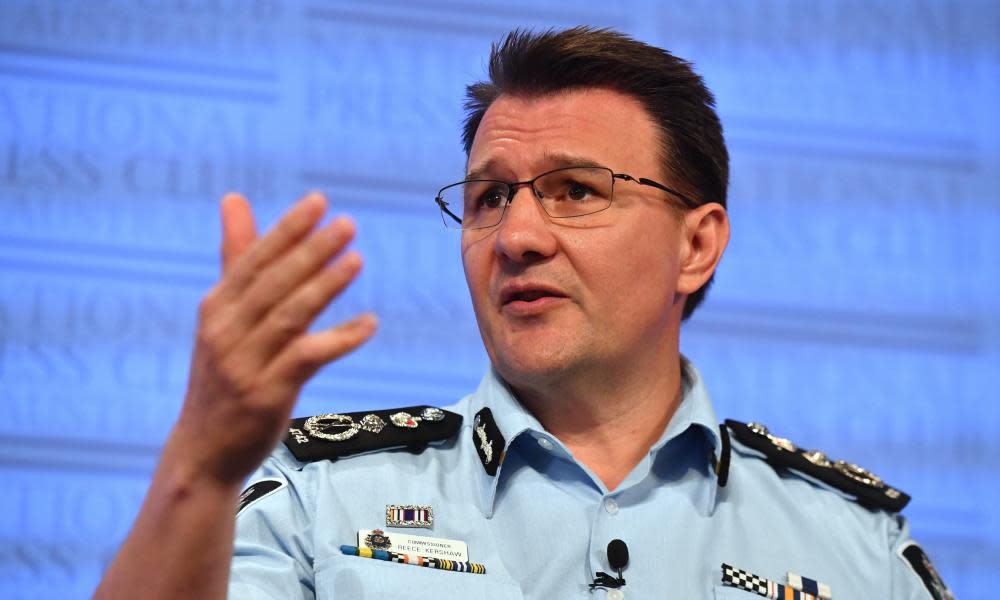AFP did not interview Angus Taylor over false document before dropping investigation

The Australian Federal Police did not interview Angus Taylor before concluding further investigation would not substantiate whether an offence had been committed in relation to a letter he signed containing inflated data about City of Sydney council’s travel spending.
The AFP commissioner, Reece Kershaw, told reporters at the National Press Club on Wednesday he was “not aware” that the minister was interviewed before the investigation was concluded earlier in February.
The comments were made after speeches from Kershaw, the Criminal Intelligence Commission chief executive, Michael Phelan, and the AusTrac chief executive, Nicole Rose, spruiking for new powers to combat child exploitation material and warning social media companies they could be named and shamed for obstructing investigations.
Related: Clover Moore demands PM explain Angus Taylor's use of false document to attack her
In October, Labor referred the letter with inflated travel figures used to politically attack the Sydney lord mayor, Clover Moore, and her record on climate change to the New South Wales police. It questioned whether the document containing inflated figures – quoted in Taylor’s letter – constituted a forgery used to influence an official in the conduct of their duty, and whether Taylor could have committed an offence by failing to report it.
On 20 December, the NSW police referred the matter to the AFP, reportedly because if any crime was committed, it would have occurred in Canberra, not Sydney.
On Wednesday, Kershaw was asked if the AFP had questioned Taylor or his staff. Kershaw replied he was “not aware that the minister was interviewed, or even offered an interview”.
“We’ve been pretty clear in the decision-making process that we came to, not being able to substantiate any offences being committed,” he said.
Kershaw said the NSW police commissioner, Mick Fuller, did not express a view about whether an offence under the NSW criminal code had been committed.
“I didn’t see the referral from NSW police, but I did receive a call from the commissioner as a courtesy, to let me know he was referring that through to us, I think around – I want to say around Christmas Eve … And the referral was made to us and then we assessed that material and made that decision.”
Morrison personally contacted Fuller by phone, leading to allegations, which were strongly denied, he had influenced the investigation.
In November, Fuller said he believed the matter would be wrapped up in a week. “To be honest with you, I actually don’t feel as though the allegations themselves are serious, in terms of the things that I would normally stand up and talk about the types of crimes,” he said.
Earlier, Kershaw, Rose and Phelan all warned of the increasing difficulty in investigating child abuse material as perpetrators rely on encryption and the dark web to hide their crimes.
Phelan proposed an “attribute-based approach”, suggesting that law enforcement agencies would like “to make it a lot easier to get in, to have a look” at suspects’ communications, subject to safeguards, rather than obtaining warrants to intercept a particular device, investigating a particular person for a particular offence.
“As the communications go very much into the dark zone, sometimes it’s very difficult to identify who the offender is,” he said.
Asked what more powers law enforcement needed to combat the problem, Kershaw said the Australian intelligence community was “pretty happy with what [the AFP] have, but there are some challenges there in some additional legislation [that is required]”.
“It wouldn’t be right for me to ventilate that here,” he said.
Kershaw and Phelan both downplayed the suggestion the powers would include expanding the Australian Signals Directorate’s domestic powers – the subject of Annika Smethurst’s reporting which resulted in two police raids.
In June, Dutton called for a “sensible discussion” about whether the ASD should gain powers to spy on and disrupt Australians’ criminal activities, which he argued could help disrupt paedophile networks and stop cyber-attacks.
Phelan said the ASD can already help law enforcement with “lawful authority”.
“So when we’re talking about modernising the interception regime, it would be law enforcement that would get those powers, which would make no extra burden or requirement for ASD other than that which they already have, which is to be able to help law enforcement if they have the ability to do so,” he said.
Kershaw said the ASD “help us under the frameworks, offshore, internationally”. The AFP did not use the ASD “domestically”, he said, except for cyber security work, such as when companies were hacked.
Kershaw reiterated the AFP’s opposition to Facebook moving all its users’ messaging into an encrypted service and confirmed Australia was working with the US through its CLOUD Act regime to speed up requests to break encryption.
He said that “all bets are off” when it comes to naming and shaming social media companies for obstructing police investigations.
“If I feel like certain companies are not cooperating, we’ll end up outing them and probably damaging their reputation.”


